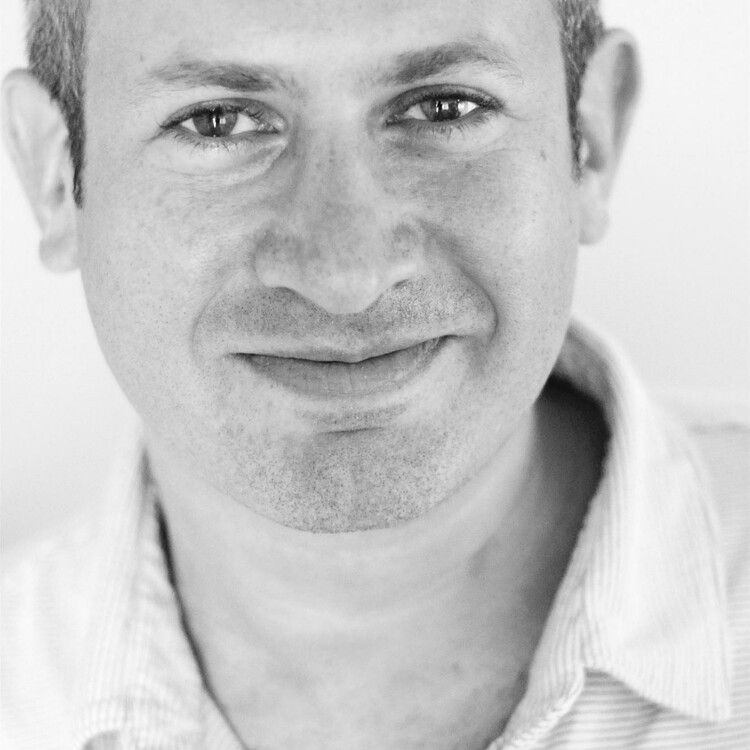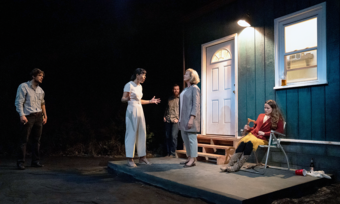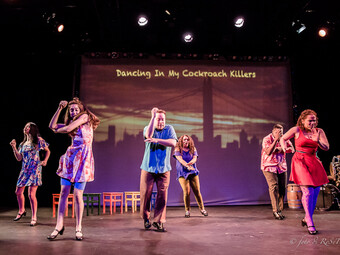Holding On to Creative Control
Can the Playwright be Wrong?
It was the idyllic production process.
The show was opening in a week. Rehearsals were going well. The three actors were doing wonderful work. The director was more than capably leading the ship. The producers handled everything outside of the room, and showed much professional restraint inside the room. We were a finely-tuned machine ready to unleash a powerful play on audiences in New York…
…except for the ending, which everyone hated…
…except me.
Could it be I was right and everyone else was wrong? My vision was strong. The humor, the twists, the ambience, the characters, everything was working. Why won’t they get on board with it? The playwright is king, dammit!
Prior to this experience I had workshopped and premiered three full-length plays and a musical. The development process was always a frenetic dance of notes, revision, rehearsal, notes, self-doubt, and more notes. Earlier in my career I would frequently take notes and change my script regardless of whether I agreed. As a people pleaser, I wanted everyone to feel involved in the collaborative process, and the best way to make sure they knew they were appreciated was to accept notes. After all, the person giving the notes must know something I didn’t, so they must be right. Right? I eventually learned how to process feedback, and make the script grow without making rash changes I would later regret.
It Is Done arrived like a fever dream. Within a week the first draft was complete. Weeks later I had a revised second draft in the hands of my favorite director, Tom Wojtunik, then the Artistic Director of the terrific Astoria Performing Arts Center. Tom scheduled a reading, and three of my favorite actors, Catia Ojeda (my then-fiancée), Ean Sheehy, and Matt Kalman, read the roles I wrote for them. The APAC reading led to a reading at The Dramatists Guild Friday Night Footlights. A chance encounter led to an agreement with site-specific producers 22Q Entertainment. Since the play takes place over eighty-five minutes in real time and is set in a rural bar in the middle of nowhere, we decided to stage it in a private bar in Times Square. Funding came into place fairly quickly. We found an excellent contract with Actors Equity allowing us to work in this nontraditional space. The production team was skilled, driven, and bursting with positive energy. Under Tom’s skilled helm we sculpted the script, creating an experience that would be darkly comic, moody, and even scary.
One big problem: the ending. After the climactic face-off between the two remaining living characters and the ultimate demise of one, Tom wanted the final blackout. However, I had written a brief epilogue: in the silence, a phone loudly rings, scaring the audience one final time. Our remaining character answers and speaks to someone mentioned earlier in the play. The onstage character quickly establishes the phone caller as the next mark, ends the call, swigs bourbon, and exits smiling. It was perfect; less than a minute long and sets the scene for life outside this world.
I loved it. Never have I been more satisfied with the final moment of a play. Tom disagreed, voicing his concern early in the process. “It’s unnecessary, it drags the show down.” I argued it was vital, satisfying, and very short. He said he wouldn’t change the script, of course, but I should consider it. I said I would.
I didn’t.
One night as Catia read the script, she said, “I’m not so sure about this ending.” And now my fragile mind was racing. She and Tom hate the ending? But I’m dead certain it’s the way to go. I think.
The next day I cornered Ean, puffing a cigarette.
“What do you think of the ending?” I asked, clearly violating Equity’s rule of leaving actors alone on break. He answered that he loved it, but he could see where people found it unnecessary. Always the politician.
Could it be I was right and everyone else was wrong? My vision was strong. The humor, the twists, the ambience, the characters, everything was working. Why won’t they get on board with it? The playwright is king, dammit! It has always been standard practice that not a word of the script can change without permission from the playwright. Every stage direction, every improvised line during rehearsal, all must meet the approval of the writer. But what happens if the loyal subjects continue to disagree with the king?
By the time tech week barreled in, Tom had regularly approached, politely and professionally. As had Catia. And the producers. But I held strong.
Everyone’s a critic. But the critics will love it! They’ll prove me right. They’ll gush on about the majestic coda to a magnificent play. “Alex Goldberg’s writing captivated until the final moment, with a tour-de-force ending that left me breathless, wanting more.” Thanks, Brantley.
A twist: at the same time, Tom made a directorial choice I did not like. I was willing to go along, as my dislike was overruled by my willingness to see if he was right. However, as tech week went on we could all see that his choice was a mistake. Rather than tell him about it, I played politician.
“Okay Tom. You want to cut the end, go ahead.” Maybe seeing me compromise would inspire him to do the same. Without missing a beat, Tom turned to the cast and the crew and told them we are cutting the end.
Applause. Not a dramatic slow clap, but full on enthusiastic applause from the cast, the stage manager, the producers; even the sound designer cried out “yesssss!” Their positivity mockingly echoed in my ears.
“But I’m still right,” I thought to myself. “I think.”
The cut was quickly implemented and executed, as if my ending never existed. And whether my move had any influence or not, Tom reversed his choice as well.
The show opened to critical and audience acclaim. We had repeat business. Extended the run. Opened another production in Los Angeles to similar acclaim (The Huffington Post named it one of the top productions of the year). A movie option followed. Currently negotiating more productions nationwide and hoping the play gets published this year. Life is good.
They say the script must be approved by the writer every step of the way. But no one creates theatre in a vacuum, so I have to accept that the ensemble mind strives to create the best work possible. What if I didn’t approve of everything? When the play is published, should I change it back to my ending or am I stuck with the compromise? Did I cave in, or was I wrong all along?
So what happens when compromises need to be made? When playwrights are fortunate enough to get published, are there still sore spots on the page as a permanent reminder of not staying strong? Are there moments where the writer is not happy with what is presented under his or her name? Is creative control a myth?










Comments
The article is just the start of the conversation—we want to know what you think about this subject, too! HowlRound is a space for knowledge-sharing, and we welcome spirited, thoughtful, and on-topic dialogue. Find our full comments policy here
So, wait, you never got to see it with the ending during previews? Don't most play-scripts in development get a short run at a smaller or regional venue to test the work and make adjustments where needed? You ought to have had the opportunity to find out how an audience receives your work and perhaps even get some feedback (if you can stand to hear it) before you make that decision.
That said, you should not be so attached to your work that you cannot bear input unless you can afford not to care about whether or not you are able to make a living with your art. Of course it's your work, but if standing firm means losing your audience (or your collaborators on the finished work, for that matter), you need to decide if the integrity of your vision is more valuable than its success.
It's a gamble. But theater is a collaborative art, and it requires a certain amount of give and take from all parties. Understand that even as the playwright, there may be times when someone else's vision will have a stronger, more positive impact on the show. Pippin would have failed miserably were it not for the power of Bob Fosse's vision.
Well said, especially about standing firm meaning losing audience and collaborators. We only had one preview performance before we opened, so it was a short window.
After writing this article I read that the producers took a while to convince Lin-Manuel Miranda to change the title of HAMILTON. For the longest time it was THE HAMILTON MIXTAPE, and he held onto that until near the end of the development process.